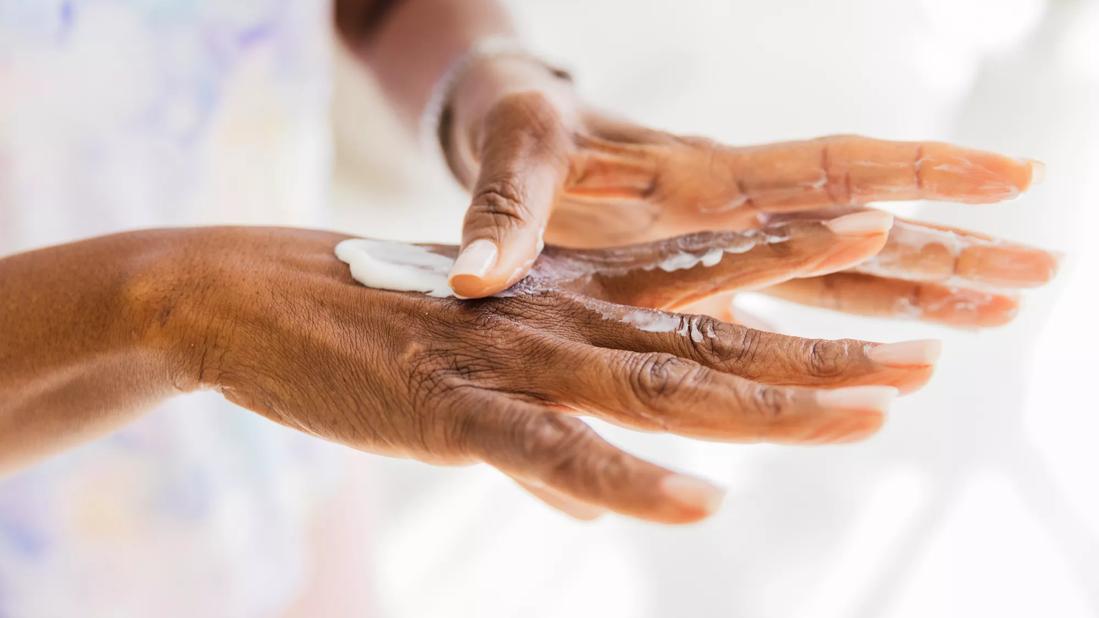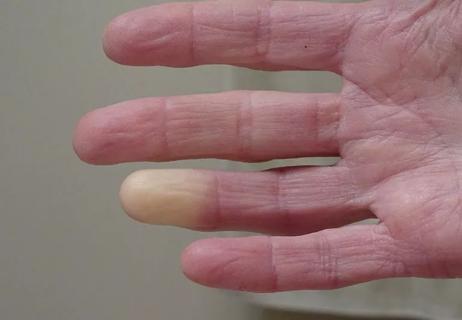To help keep your mitts feeling and looking their best, moisturize, exfoliate, wear sunscreen and eat a healthy diet

You work hard to keep your skin healthy and happy. You moisturize after every shower. You apply sunscreen and wear wide-brimmed hats when you’re outside.
Advertisement
Cleveland Clinic is a non-profit academic medical center. Advertising on our site helps support our mission. We do not endorse non-Cleveland Clinic products or services. Policy
But your hands need protection and care, too. Neglecting your hands could lead them to look much older than you are.
“Most of us have a skin care regimen for our faces, but we often forget about our hands,” says hand and cosmetic surgeon Bryan Michelow, MD. “And that’s a mistake for two reasons — nature and nurture.”
It’s never too late to start taking good care of them. Moisturizer, sunscreen and other treatments can help get you on your way.
Dr. Michelow and dermatologist Amy Kassouf, MD, explain how to make your hands look younger.
Ever wonder what causes aging hands? The answer is found in the way your body changes as a whole over time. But you can intervene in how it happens.
“Dry, scaly skin, brittle nails and dark age spots can become problems as people get older,” says Dr. Kassouf.
And you may have noticed wrinkly hands. As you age, your hands lose fat and elasticity and your skin loses volume. This reduced volume and decreased elasticity produces translucent skin that wrinkles and develops age spots.
Age spots, also called liver spots or solar lentigines, happen after exposure to ultraviolet (UV) light and can be various shades of brown or black. They appear on areas most exposed to the sun, when melanin is abundant because of sun exposure. You can get them at any age, especially if you spend a lot of time outdoors or use tanning beds (which are never recommended).
Advertisement
“We expose our hands to the sun and other noxious elements more than any other part of the body,” says Dr. Michelow.
And, because hands do so much, they get washed more throughout the day.
“Frequent washing in hot water removes the natural oils that lubricate your skin and protect against dry and cracked surfaces,” Dr. Michelow adds.
The good news is there are many ways to prevent and fight signs of aging on your hands. Dr. Kassouf and Dr. Michelow explain how to keep your hands healthy and looking young.
So, what should you do if you’ve noticed that your hands are looking older than you’d like? Is there a procedure to make your hands look younger? Dr. Kassouf and Dr. Michelow offer the following suggestions:
Advertisement
Just as important as what you can do to deter signs of aging? What NOT to do.
And when you’re looking for anti-aging hand treatments to use at home, Dr. Kassouf has some additional guidance. There are two kinds of products to use to help heal your skin. The first are humectants, ingredients like hyaluronic acid that help bind water into your skin to hydrate it. Second, there are products containing lipids or fats that are the emollients that improve the barrier function of your skin, helping to keep all of the unwanted things out.
“Both are important now more than ever for the health and beauty of your skin and especially your hands,” Dr. Kassouf emphasizes.
Advertisement
Learn more about our editorial process.
Advertisement

Learn the possible causes of cold extremities and when you should see a doctor

It’s a great disinfectant for around your home, but not for your skin

Changes in texture, smell, color and performance are signs it’s time to throw the cosmetic item away

Follow the 4Cs — cooling, cleaning, covering and comforting — to start the healing process

Bathing once a day is the general guidance, but you could also have reasons to soap up twice a day or not at all
There’s not one specific cure-all diet for eczema, but it helps to keep track of what you eat and when you experience symptoms

It’s best to avoid picking at zits, which can damage your skin (though there are ways to minimize the risk)

Both inflammatory conditions have varying triggers and symptoms

Wearing a scarf, adjusting your outdoor activities and following your asthma treatment plan can help limit breathing problems

Your diet in the weeks, days and hours ahead of your race can power you to the finish line

When someone guilt trips you, they’re using emotionally manipulative behavior to try to get you to act a certain way